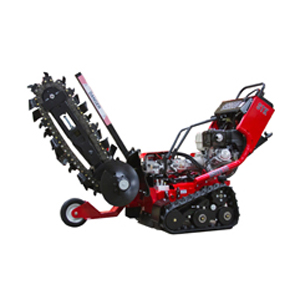If the work requires moving a lot of earth, you’ll almost certainly need a trencher. Trenchers come in a variety of sizes and shapes, and they may be used for a variety of jobs ranging from cutting pavements to snipping roots. Trenchers are earthmoving devices that are large and heavy. No matter what sort of trencher you’re using, the essential components are the same.
Trenchers feature a metal chain with high-strength steel teeth. This enables the machine to rip into the ground, lifting and transporting large volumes of soil. Trenchers are capable of blasting through thickly packed ground and hefty tree root systems due to their sheer size and strength. You’re correct if you assume a trencher sounds a lot like an excavator. The key distinction is the type of ditch created by the machines:
- Excavators create ditches that are much wider at the top than the bottom, leaving you with a lot of backfill to cope with.
- A trencher generates precisely what its name implies: a trench. A neat trench with a smooth bottom and sides.
Trenchers are more useful for excavating straight and smooth trenches. They also allow you to work more quickly than excavators. Excavators, on the other hand, are more adaptable. They can work on various terrains and dig sloping ditches.
Trenchers are used for the following applications:
- Cutting Pavement: Wheel trenchers can cut through rock, pavement or concrete.
- Creating Drainage: Chain trenchers create drainage trenches for both sewage and water runoff.
- Shoveling: Walk-behind trenchers dig up to 4 feet deep.
- Digging for Electrical Wires: Chain trenchers easily remove excavated materials.
- Piping Work: Chain trenchers eliminate excavated materials, perfect for piping work.
- Snipping Roots: Portable trenchers have a lawnmower-like blade to easily sever roots.










